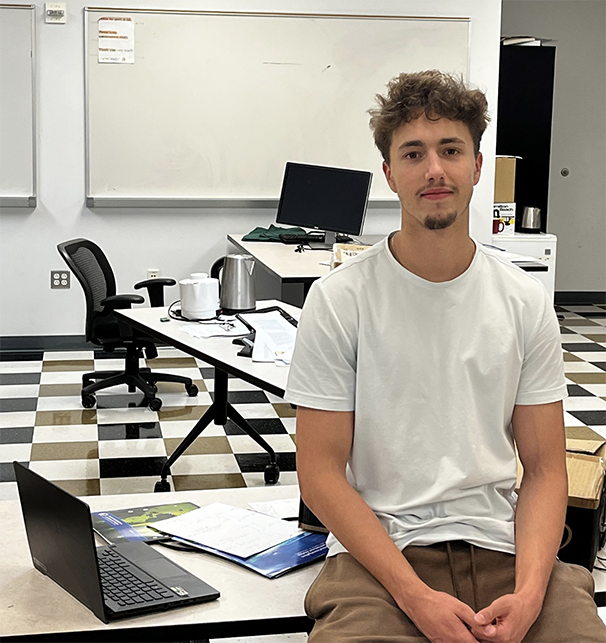Recent News
UNM Engineering team wins ASEE best paper for work on first-year engineering course
July 17, 2025
New director will enhance interdisciplinary engineering learning opportunities
July 2, 2025
Final SIRI cohort visits UNM campus
June 30, 2025
Perfetti receives ANS Landis Engineering Achievement Award
June 26, 2025
News Archives
Computer science student navigates crime’s depths with AI at Department of Homeland Security internship
August 25, 2023 - by Kim Delker

Computer science student Younes Slaoui was always interested in AI. And thanks to an opportunity he received last spring from Engineering Student Success Center at UNM, he was able to work on a project for the Department of Homeland Security (DHS) that allowed him to gain a deeper understanding of machine learning and its real-world applications in problems such as criminal activity.
After taking part in a summer internship with the DHS Criminal Investigation and Network Analysis (CINA) division at George Mason University in Virginia, Slaoui said he gained a wide range of both personal and professional skills that makes him feel better prepared for a career.
Slaoui, a junior in computer science, worked in a team led by Francesco Sorrentino, professor of mechanical engineering, on developing a software tool that uses artificial intelligence to model, predict and detect criminal activity. The findings could help law enforcement and investigators at all levels project when and where crimes are likely to occur, as well as where to search for evidence of past crimes that haven't been solved yet.
His final project was titled “Reservoir Computing: Navigating Crime’s Depths with AI,” which utilized publicly available crime data in the Washington, D.C., area from 2015-2019. He started by feeding in the data to the “crime observer” software to learn the correlation between 25 different crimes. He said one of the highest correlated set of crimes was “Release Violation/Fugitive” à “Theft from Auto.”
His final paper on the internship project explored the capabilities and applications of reservoir computing, which is a machine learning model that is fast to train and has been successfully used to process both temporal data and spatio-temporal data.
Through a lot of programming and data science work, the team was able to make estimates of when and where crimes are likely to occur in the future, what kinds of crimes are likely, and where to search for evidence of past crimes that happened on specific dates.
Although there was an overall goal for the project, Slaoui found that there was a good amount of freedom, creativity and growth potential in the internship as he progressed from June through August.
“I got the chance to think independently and do things on my own. I learned a lot about the training and testing of machine learning models and became proficient in the software MATLAB which I hadn’t used before.” he said.
One of the highlights of working with government officials was listening to a talk by former FBI profiler Mary Ellen O’Toole, an expert on the criminal mind who uses psychology to solicit truth (and confessions) from serial killers.
Beyond the work on the project, he said he enjoyed being back in the Washington area (he was born and spent his early childhood in Maryland), having a chance to catch up with grade-school friends.
Although he is still an undergraduate, this internship gave him some more clarity on what he’d like to do after he graduates.
Slaoui, who lived in Morocco from ages 9-18, speaks four languages: English, Arabic, French and Darija (Moroccan dialect). Along with his technical background, he has realized he possesses a unique set of skills that could qualify him for work with the U.S. government (he had a summer internship previously working with online databases for the Moroccan government).
“I had great networking opportunities at CINA. It opened up a whole new door for working in the government,” he said. “Before the internship, I hadn’t thought much about it. I invited the director of CINA and the Education and Workforce Development Lead out to lunch. We had a great conversation, and I learned a lot. They said I would be a good fit for the CIA.”
For a student who began his higher education journey at the University of Denver, before transferring to the University of New Mexico, he is glad for the experiences that UNM has provided him since he transferred here. He is grateful especially to Engineering Student Success Center, who first alerted him to this internship, as well as one this semester at Indica Labs, where he will apply his software engineering skills to pathology and health care.
“I feel like I have learned a lot of general research skills and technical skills.” he said. “It was a great experience.”
